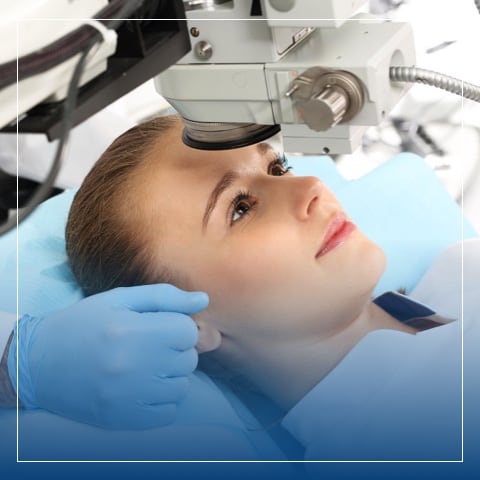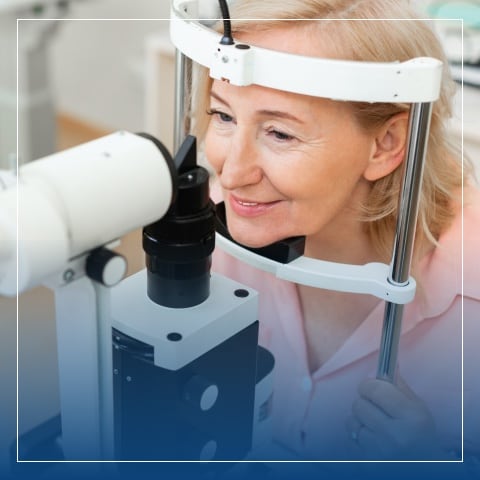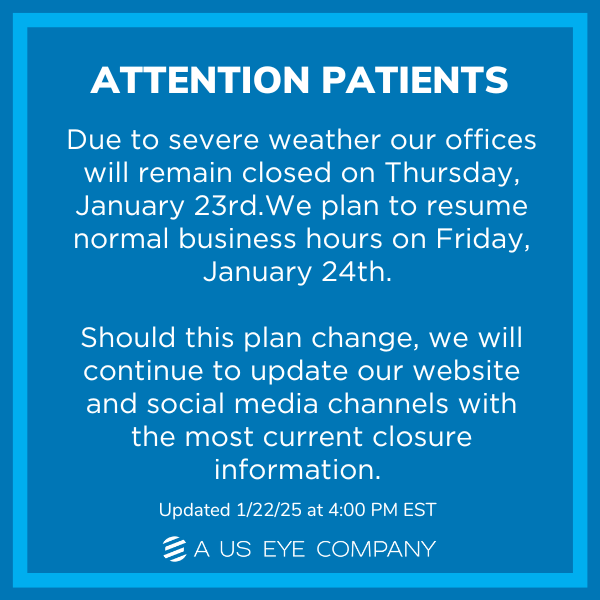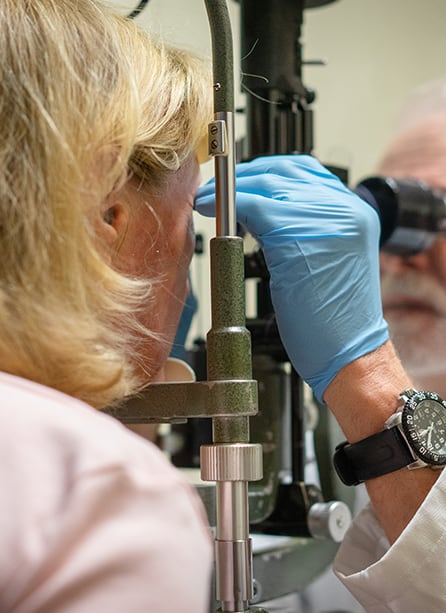

Prevent Vision Loss
Diabetes is a leading cause of vision loss in adults. Yet, most eye problems caused by diabetic eye disease are preventable. A regular diabetic retinopathy exam can help monitor changes to eye health and implement diabetic macular edema treatment before symptoms worsen.
The American Diabetes Association (ADA) recommends adults have yearly eye exams to protect vision and eye health. Contact Carolina Eyecare Physicians for diabetic eye care today.
What Is Diabetic Eye Disease?
The longer you live with diabetes, the more likely you are to develop conditions affecting your eye health. Both type 1 and type 2 diabetes can increase the risk of developing diabetic eye disease.
Diabetic eye disease is a group of eye problems including:
Diabetic eye disease can develop slowly, and patients may not initially notice symptoms or vision problems. Over time, high blood sugar levels cause damage to blood vessels in the eye. The damage can impair vision and interrupt essential eye functions.

Diabetic Eye Disease Overview
Diabetes can cause multiple eye problems, including blurry or double vision. Additional symptoms are specific to the type of eye condition. Take a closer look at how diabetes can lead to cataracts, diabetic macular edema, diabetic retinopathy, and glaucoma eye disease.
Cataracts
Excess blood sugar can cause changes in the eye’s lens, leading to cataract development. The hazy, cloudy spots can interfere with vision. In some cases, cataract eye surgery may be necessary to help improve visual comfort. Maintaining healthy blood sugar levels can help prevent cataracts or slow development.
Diabetic Macular Edema
Macular edema occurs when fluid buildup causes swelling and thickening of the macula. The swelling can damage the macula, causing vision impairment. Diabetic macular edema is typically caused by diabetic retinopathy.
Diabetic Retinopathy
Diabetic retinopathy is when abnormal blood vessels develop around the retina, often swelling or leaking fluid into the eye. Diabetes and poor blood sugar levels can lead to the growth of abnormal blood vessels.
Glaucoma
Glaucoma is a group of diseases that cause irreversible damage to the optic nerve. It usually develops as a result of increased eye pressure, which can occur when abnormal blood vessels leak excess fluid into the eye. Diabetes can double your chance of getting glaucoma.
Diagnosing Diabetic Eye Disease
At Carolina Eyecare Physicians, we use various diagnostic technologies to evaluate your eye health. Some common devices patients can expect at their next diabetic eye exam include fundus and retinal imaging technology.
Digital Fundus Imaging
Diabetic eye disease can affect essential tissue located at the back of the eye (the fundus). Fundus imaging uses a low-power microscope to photograph the interior surface and back of the eye, including the retina, macula, optic nerve, fovea, and blood vessels.
Digital fundus imaging is a noninvasive test that can be completed in a few minutes. The device captures images by peering through the pupil, so pupil dilation is necessary to effectively evaluate the back of the eye.
Optos Retinal Imaging
Optos retinal imaging creates a map of internal eye structures, particularly the back of the eye. Eyes have unique shapes, so what may be a normal structure for one patient may be abnormal for another. With a detailed map of your eye, your eye doctor can monitor changes to eye structures to assess your ocular health.
Zeiss Clarus 500 Retinal Imaging
The Clarus 500 retinal imaging technology provides 200° high-resolution color fundus imaging. Capturing details about the unique shape and structure of your eyes is crucial for diagnosing eye conditions. Color imaging can help your eye doctor track even subtle changes inside the eye.

Book Your Diabetic Eye Exam
Yearly diabetic eye exams can help patients preserve their vision. Patients with eye problems may require more frequent exams to observe eye tissue and vision changes. Talk to your eye doctor about exam frequency and what you can do to protect your eye health. Book a diabetic eye care exam with Carolina Eyecare Physicians.
Frequently Asked Questions
Why do I need a regular eye exam if I have diabetes?
If you have diabetes, a regular eye exam for diabetic retinopathy is vital even if your vision seems fine. Many diabetes-related eye complications begin silently, and only a proper exam can catch them early, giving you a much better chance for effective diabetic eye care.
What exactly happens during a diabetic eye exam?
During your exam, your eye doctor will usually dilate your pupils and use advanced imaging (like fundus or retinal imaging) to inspect the back of your eye retina, macula, optic nerve, and blood vessels. This helps detect signs of damage early so that, if needed, diabetic retinopathy treatment can begin before vision gets worse.
How often should people with diabetes get their eyes checked?
For many, an annual exam is recommended to ensure healthy eyes, especially since diabetes can affect vision over time. If no problems are found, your eye doctor may set a slightly longer schedule, but once any diabetic eye disease appears, more frequent check-ups are usually advised.
Can regular exams really prevent serious vision loss from diabetic eye disease?
Yes, timely diabetic eye care through consistent exams catches early damage so your doctor can act before it worsens. With proper follow-up and, if needed, diabetic retinopathy treatment, many vision-threatening problems can be prevented or significantly slowed.
If I feel fine and don’t notice vision problems, is an exam still necessary?
Absolutely. Many diabetes-related eye issues develop without apparent symptoms. Even when vision feels normal, an eye exam for diabetic retinopathy may reveal early damage, and early detection gives you the best chance for successful diabetic retinopathy treatment and long-lasting vision.
Locations
We have several convenient locations throughout South Carolina. Please view the nearest location to you or get directions below.
Our Services
News
Cataracts vs Glaucoma: The Difference and When to Get Checked
Cataracts, Glaucoma, UncategorizedVision changes rarely announce themselves in a single dramatic moment. More often, it starts as a slight friction that builds. Headlights feel harsher at night. Print looks slightly softer. One eye seems to “do more work” than the other. Two of the most common causes of those shifts are cataracts and glaucoma, and they matter […]
Read More… from Cataracts vs Glaucoma: The Difference and When to Get Checked
Can You Get Laser Eye Surgery After Cataract Surgery? What Patients Should Know
Cataract Surgery, UncategorizedMany people see a big improvement after cataract surgery, then notice a change later. Sometimes vision gets hazy again months or years down the line. In other cases, the vision is clearer than before, but glasses still help with certain tasks. Depending on the cause, a laser procedure after cataract surgery may be an option. […]
Read More… from Can You Get Laser Eye Surgery After Cataract Surgery? What Patients Should Know
Dry Eyes in Winter: Relief Tips and When to Visit Your Eye Doctor
Dry EyeWinter often feels cozy, with heavier clothes, warm drinks, and more time indoors. For many people, it also brings a change in eye comfort. Dry, itchy, burning eyes become more common as the air dries out and indoor heating runs for longer stretches. When dry eyes in winter move from an occasional annoyance to a […]
Read More… from Dry Eyes in Winter: Relief Tips and When to Visit Your Eye Doctor
Cataracts vs Glaucoma: The Difference and When to Get Checked
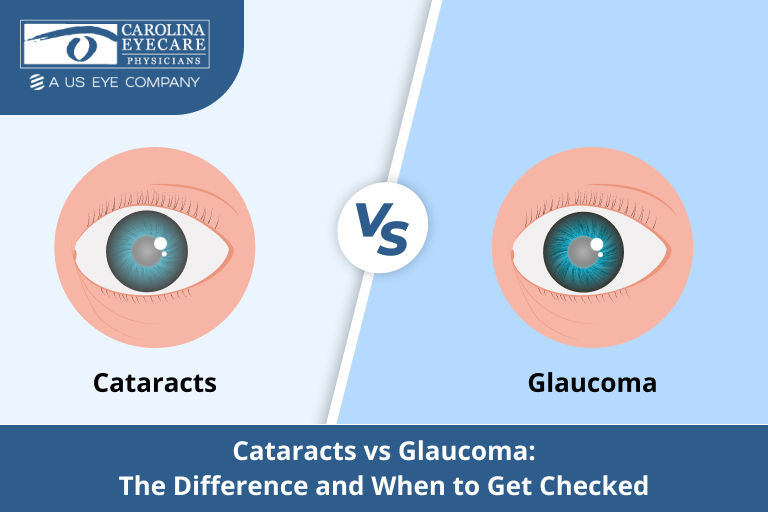
Vision changes rarely announce themselves in a single dramatic moment. More often, it starts as a slight friction that builds. Headlights feel harsher at night. Print looks slightly softer. One eye seems to “do more work” than the other. Two of the most common causes of those shifts are cataracts and glaucoma, and they matter […]
Read More… from Cataracts vs Glaucoma: The Difference and When to Get Checked
Can You Get Laser Eye Surgery After Cataract Surgery? What Patients Should Know

Many people see a big improvement after cataract surgery, then notice a change later. Sometimes vision gets hazy again months or years down the line. In other cases, the vision is clearer than before, but glasses still help with certain tasks. Depending on the cause, a laser procedure after cataract surgery may be an option. […]
Read More… from Can You Get Laser Eye Surgery After Cataract Surgery? What Patients Should Know
Dry Eyes in Winter: Relief Tips and When to Visit Your Eye Doctor

Winter often feels cozy, with heavier clothes, warm drinks, and more time indoors. For many people, it also brings a change in eye comfort. Dry, itchy, burning eyes become more common as the air dries out and indoor heating runs for longer stretches. When dry eyes in winter move from an occasional annoyance to a […]
Read More… from Dry Eyes in Winter: Relief Tips and When to Visit Your Eye Doctor


We are a proud partner of US Eye, a leading group of patient-centric, vertically integrated multi-specialty physician practices providing patients with care in ophthalmology, optometry, dermatology, audiology, and cosmetic facial surgery.



